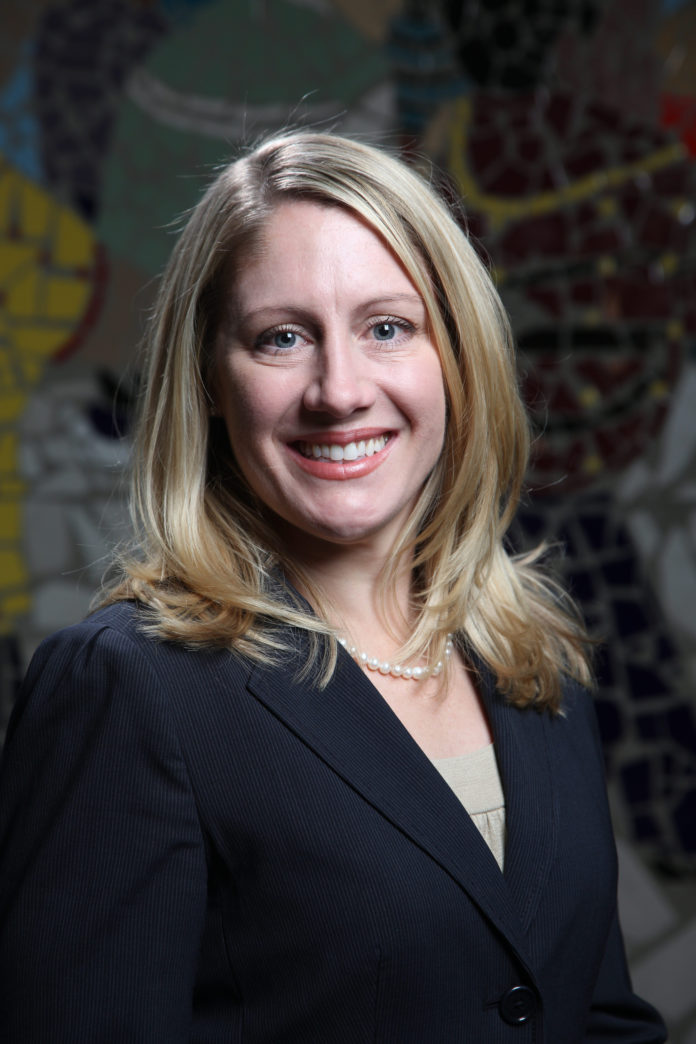
By Jenna Fitzgerald | Copy Editor
With a $3.1 million grant from the National Institutes of Health and almost a year of material development and focus groups under her belt, associate professor Dr. Danielle Parrish is preparing to launch the clinical trial for CHOICES-TEEN, a study of risk reduction interventions for young women in the juvenile justice system.
Parrish said her interest in the project came from her foundational desire “to empower and support underserved, often forgotten individuals” coupled with her field placement experience at a juvenile detention center in Fresno, California.
“I saw so many strengths, so much potential, and so many were at this pivotal point in their lives where they could start to make important decisions about their future,” Parrish said. “Yet many of them are struggling with so many challenges: family dynamics, gang involvement, difficulty in school or with educational disabilities, substance use, abuse, trauma exposure, mental health symptoms and — in young women specifically — high rates of pregnancy.”
According to Parrish, many of the young women in the juvenile justice system who were pregnant were also drinking alcohol or using other substances — actions that can cause fetal alcohol spectrum disorders, which can result in physical, behavioral and learning problems for children. She said the project targets a reduction of these substance-exposed pregnancies, thereby decreasing both substance use and pregnancies.
“We’re taking this sort of bundled risk reduction approach because all of these risk factors kind of overlap, and we can address them simultaneously,” Parrish said. “What I’m excited about is it’s more efficient. We’re using technology to enhance the reach of the intervention. And fortunately, NIH thought it was innovative too — they funded it. So we’re actually just very excited to get this launched in the community, and we’re very close.”
Parrish said her inspiration for the project came from her post-doctoral experience at the University of Texas at Austin’s Health Behavior Research and Training Institute. While there, she worked under the mentorship of Dr. Mary Velasquez, the developer of CHOICES, a program steered toward adult women that aims at a reduction of alcohol-exposed pregnancies. Parrish said CHOICES served as the model for CHOICES-TEEN.
“I learned about implementing large randomized clinical trials and realized the potential application of this intervention for these youth that I had worked with in the past,” Parrish said. “So CHOICES-TEEN is really an adaptation of that empirically tested intervention, and we’ve basically adapted it for young women in the juvenile justice system to be more developmentally appropriate, acceptable, feasible.”
Project coordinator Cherisha Williams worked with CHOICES before shifting to its new iteration in CHOICES-TEEN. She said the name ‘CHOICES’ is meant to convey the project’s goal to empower women to make their own decisions after supplying them with the appropriate knowledge base.
“We use motivational interviewing; the style and the spirit of motivational interviewing is we want to make sure that we honor what or where they’re coming from,” Williams said. “So when we say ‘CHOICES,’ it is their choice. We’re going to give them some information, but what they do with that information is completely up to them. We want to let them know that we understand that they are in control of their lives and they know themselves better than we do.”
According to Parrish, CHOICES-TEEN is a partnership between Baylor and the University of Texas at Austin. She said the project — which is based in Houston and receives referrals from the Harris County Juvenile Probation Department — consists of a four-session intervention, with the first session being in person and the subsequent three being via telehealth.
“Three of the sessions are with a master’s-level counselor,” Parrish said. “That’s using what we call motivational interviewing, which is a real good fit for the youth … And we have one session that’s provided using telehealth with a medical doctor, so this is just a counseling session, but they answer all the questions that the youth have about their health.”
Williams said CHOICES-TEEN is unique and important because of its preventative approach to the issue of substance-exposed pregnancies.
“In general, when we think about health care, preventative measures are not something that our society really focuses on,” Williams said. “I think we come at it at an angle where things have already happened, so I think preventative programs are always something that need to be put out there because you can stop these things from happening. They don’t have to happen with education, and the problem is some people just don’t have that education. So I think that we are one of those preventative programs that can be so vital, especially, again, to this population who might not have the information. We all know that knowledge is power.”
As they prepare to launch the clinical trial for CHOICES-TEEN, Parrish and Williams both said they hope the project will prove to offer an effective intervention that can impact young women in the juvenile justice system.
“I would say my greatest hope is that it’s valuable, that the things that we’re giving to them can be tools that make a difference in their lives,” Williams said. “My mission in life is always to just destigmatize mental health care in general, getting assistance when it comes to certain things … I just feel like they have so much ahead of them, and I’m just hoping that they can use these tools to be able to get around any barriers that they feel are holding them back.”





